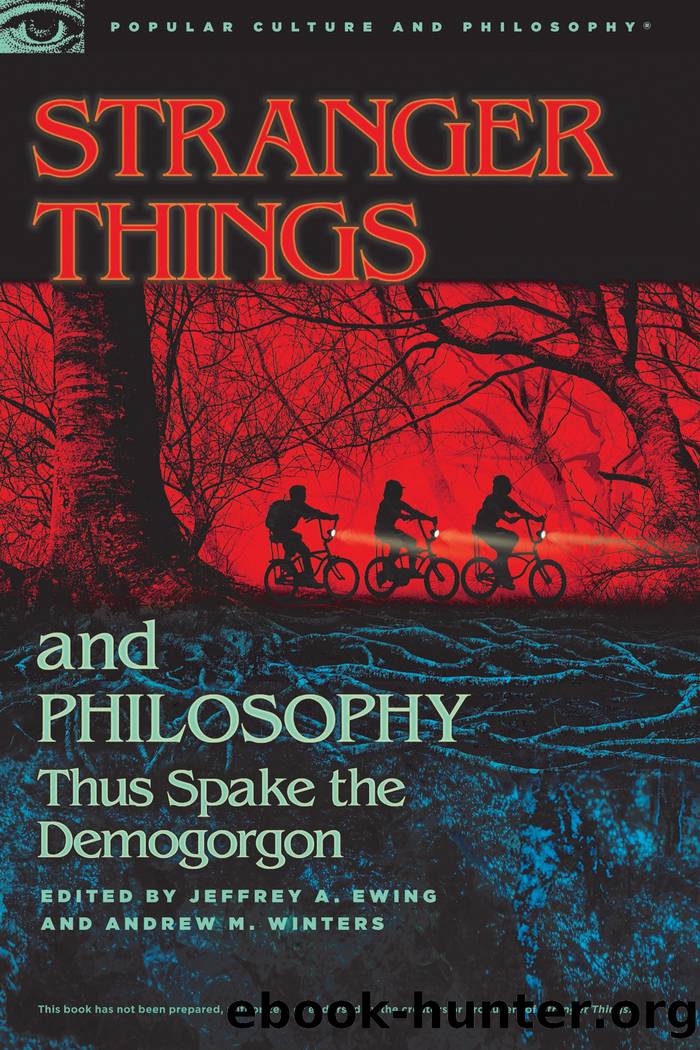Stranger Things and Philosophy by Unknown

Author:Unknown
Language: eng
Format: epub
Publisher: Open Court
Published: 2019-07-14T16:00:00+00:00
Nothing Is Gonna Go Back to the Way that It Was. Not Really
Memory goes wrong in mundane and minor, or in dramatic and disastrous ways.
—JOHN SUTTON, “Memory”
The Mind Flayers are a race of monstrous beings hailing from an unknown D&D dimension, using psionic powers to enslave and control others. One of them shows up in Season Two of Stranger Things, only inside of Will Byers. The ex-abductee, already primed for exploitation, is possessed by the creature, which intermittently uses Will’s baby-face facade to trick and trap those around him.
The Mind Flayer is not an intentional reference to memory; but it’s no stretch to infer the diabolical nature of the powers of recollection—Will talks of “now memories,” a kind of prescience that ends up being sometimes true, and sometimes a ruse to round up folks like a Demogorgon ready meal. Although Will is ‘Will the Wise’ in the boys’ basement fort, in real life he’s a captive of some malevolent force and we can’t trust his control over his own mind.
While It digs down into the grittiness of things that happen, and Stranger Things functions as a nostalgic escape from the things that happen, both use their fantasy elements allegorically. For example, as “The Mind Flayer” episode reaches its climax, the beasts of the Upside Down claw their way through the rift torn open by El’s psychokinesis, converging on Hawkins’s Lab, a Freudian terror of confronting all the hidden and forgotten shit (its sole aim, destruction).
At the same time, the show touches on memory distortion more directly (for all Stranger Things’s differences with It, inventing memories is in our DNA; it can’t help but come out in any and every human story)—when Joyce Byers asks police chief Hopper to help her find her missing son, relaying the impossible events surrounding his disappearance, Hopper’s response is poignant. He tells her that after his daughter’s death, he thought he saw her and heard her, too. He had to accept those seemingly paranormal visitations for his grieving mind playing tricks on him: “Otherwise, I was going to fall down a hole, that I couldn’t get out of” (“The Body”). His words aren’t just a macabre reference to how Hopper believes Will has died, but An Alice in Wonderland allusion to going down the rabbit hole of insanity; for misinterpreting events and committing them to sacred memory.
This idea is augmented by Joyce’s dreams, woven in with flashbacks of Will; her nocturnal recollections have a veil of non-reality as she visits Will in his makeshift fort, Castle Byers, their encounter shot through with shafts of celestial light and too-bright color—that rosy retrospection (“The Vanishing of Will Byers”).
In the second installment of Stranger Things Will is afflicted with the anniversary effect, a real psychological phenomenon that, around the anniversary of a traumatic event, confronts the sufferer with an unusually high number of memories of their trauma. The mechanism behind this may be evolutionary—a kind of protective reminder not to repeat past mistakes, but more simply, it’s also
Download
This site does not store any files on its server. We only index and link to content provided by other sites. Please contact the content providers to delete copyright contents if any and email us, we'll remove relevant links or contents immediately.
Kathy Andrews Collection by Kathy Andrews(10520)
The remains of the day by Kazuo Ishiguro(7551)
Spare by Prince Harry The Duke of Sussex(4196)
Paper Towns by Green John(4169)
The Body: A Guide for Occupants by Bill Bryson(3801)
Be in a Treehouse by Pete Nelson(3212)
Harry Potter and the Goblet Of Fire by J.K. Rowling(3045)
Goodbye Paradise(2963)
Never by Ken Follett(2880)
Into Thin Air by Jon Krakauer(2701)
The Remains of the Day by Kazuo Ishiguro(2618)
The Genius of Japanese Carpentry by Azby Brown(2609)
The Cellar by Natasha Preston(2595)
Drawing Shortcuts: Developing Quick Drawing Skills Using Today's Technology by Leggitt Jim(2532)
120 Days of Sodom by Marquis de Sade(2438)
Architecture 101 by Nicole Bridge(2350)
The Man Who Died Twice by Richard Osman(2299)
Machine Learning at Scale with H2O by Gregory Keys | David Whiting(2291)
Fairy Tale by Stephen King(2069)
